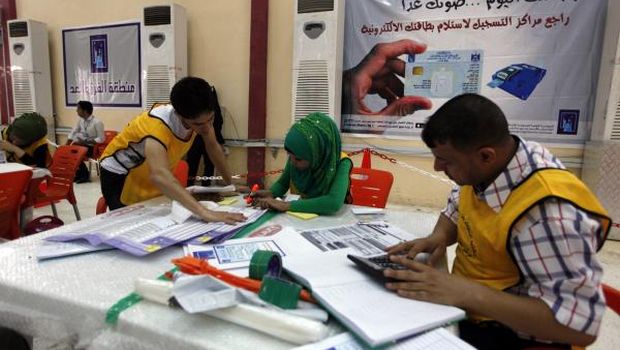
Workers from the Iraqi Independent High Electoral Commission (IHEC) count votes at an analysis center in Baghdad on May 3, 2014. (Reuters/Ahmed Saad)
Baghdad, Asharq Al-Awsat—Iraqi Prime Minister Nuri Al-Maliki rejected calls from the leader of the Shi’a Islamic Supreme Council of Iraq (ISCI) to reform the National Iraqi Alliance on Saturday.
ISCI leader Ammar Al-Hakim called for the recreation of the Alliance, an electoral coalition of largely Shi’a parties that was originally formed in 2004 and once included Maliki’s Al-Da’wa party. His call reportedly came after the unexpected success of the Sunni secular-leaning Iraqiya List led by former PM Iyad Allawi in last Wednesday’s election.
Maliki’s party broke away from the National Iraqi Alliance to contest the 2010 election as part of the State of Law coalition. Early returns from last week’s poll suggest that Maliki’s State of Law coalition has not won the majority that will give him a third term in office, meaning that an extended round of political negotiations will be necessary to assemble a parliamentary majority and form a new government.
Iraq’s previous parliamentary elections in June 2010 were followed by months of negotiations, with a new government not formed until November of that year.
Signs are already emerging that Maliki is attempting to construct a new alliance in Iraq’s 325-seat parliament to place himself at the head of a majority of legislators.
Maliki, who described his Kurdish adversaries in Erbil as a “miserable team” during the election campaign, changed tack one day later, signaling that he was willing to coordinate with Kurdish Democratic Party (KDP) leader and Kurdistan regional president Massoud Barzani.
Maliki said: “What is between us and Massoud Barzani is a strategic alliance and there are no sectarian or ethnic differences.”
However, Maliki faces obstacles not from his traditional opponents, but from former allies like ISCI’s Ammar Al-Hakim and influential Shi’a cleric Moqtada Al-Sadr, who say they are determined to prevent him from obtaining another term in office, but Hakim in particular is seen as still wanting to form a Shi’ite-led political alliance capable of forming Iraq’s next government.
Meanwhile, Muhannad Hussam Al-Din, leading figure of the Sunni National Dialogue Front told Asharq Al-Awsat that Arab Sunnis, including the Saleh Al-Mutlaq’s list, “did not support a third term for Maliki in any shape or form.”
“The reforming of sectarian and ethnic alliances once again would not help form a political majority government that could lead the country out of its current crises,” he added.
An MP for Maliki’s State of Law coalition, Abboud Al-Issawi, said the National Iraqi Alliance “would not be successful in the future,” given its previous fragmentation, “but it may be needed in the future based on the actions of the other parties [within it].”
The other parties, according to Issawi, are not the Sunni or Kurdish partners, but Shi’ites.
He said: “[State of Law] insists on forming the government based on a political majority because it is a way out of the worsening crisis which faces the . . . government, and a way out of the political crisis and difficulties which face the current parliament.”
Hakim, in contrast, called for “reforming the National [Iraqi] Alliance and turning it into a united, integrated and powerful institution.”
Hakim added: “There is no monopoly of power in Iraq and no marginalization of any constituent or a monopoly of decision-making, and we will work with a strong, homogenous team to make joint decisions which could end the crises.”
Meanwhile, Hakim Al-Zamili, a leading figure from the Sadrist Movement, told Asharq Al-Awsat that the Sadrists reiterated that “everyone’s desire now is represented in a true political majority government which can help us overcome the failed experience of the last eight years, which failed to achieve anything.”
Mohammad Al-Khalidi, a leading member of the Sunni Mutahidoun bloc, told Asharq Al-Awsat: “Maliki can no longer guarantee [the majority he needs], as it is not desirable within the National [Iraqi] Alliance. He will rely on the smaller alliances, while we, along with the Sadrist Movement, the ISCI, and the Kurds, can guarantee 225 votes, which is an overwhelming majority.”
